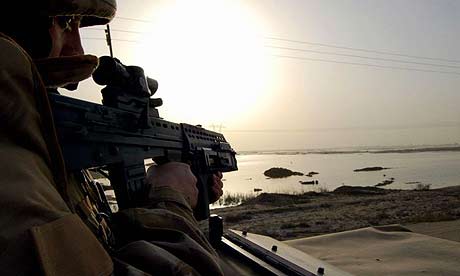A veteran's remorse: what have we done to Iraq?
The US and UK betrayed the goodwill of the Iraqis and made too many of us complicit with their crimes

A British soldier patrols the northern suburbs of the Iraqi city of Basra. Photograph: Dave Clark/AFP/Getty images
Iraq. We've all been there by now, 10 years having passed since that heady dash across the Mesopotamian sands in March 2003.
One of my fonder memories of time spent there comes from a midday patrol through the streets of Al Amarah, in 2004, a town in the southeastern province of Maysan. The temperature was the wrong side of 40C, lines of salt from evaporated sweat traced my desert combats, and every muscle ached.
After halting the patrol and taking a knee, I saw an Iraqi man appear from a small shack. He hurried over to me, beaming and carrying a metal tray, on which sat a tiny glass of steaming tea, swirling with sugar.
"Shukran jazelan," I said appreciatively and through cracked lips, and savoured the best tasting brew I've ever had.
There's a couple of takeaway points from that incident, I'd venture. It highlights the innate friendliness and hospitality of the Iraqi people, which also tends to be the norm with inhabitants of the Middle East. Muslims are a friendly, even gregarious bunch on the whole. In the face of such goodwill, it also reveals the magnitude of betrayal by the coalition militaries and, by extension, the populations of the countries that sent them. I don't find it particularly easy to look an Iraqi in the eyes these days; I don't see how many people in the US and UK could.
My nine-year British Army career started in 2001 and spanned the entire debacle of Iraq. What is an Iraq veteran left with? For me, it starts with a sense of collective guilt for participating in an event that led to an estimated 120,000 civilian deaths and demolished a country.
And that's before one gets to the sense of personal guilt for individual failures. Giving an Iraqi mother short shrift at the gate to Camp Abu Naji, outside Al Amarah, when she came to enquire about a son arrested during an operation a few nights before, is but one example for me.
I really didn't know what had happened to her son; a cursory check with the operations room indicated no one else did, either. But to this day I can't believe I didn't try harder to do more for her. It was, after all, a mother asking for her son: a yearning and emotional cost that lingers for every Iraqi male, insurgent, raghead – or whichever callous label we reduced them to – whom we shot, shelled, bombed, interrogated, cuffed, hooded, etc.
There's no excuse for my behaviour, though in trying to cling to some rationale perhaps I'd begun to sense the whole enterprise – and my role in it – was flawed; a sense heightened as the years rumbled by, including a return tour in 2006, which culminated in a severe realisation that the emperor had no clothes.
All that stale rhetoric and those grandiose concepts of nation building and bestowing democracy – it crumbled in the glare of a sad reality and pointlessness I encountered. Friends were killed in downed helicopters or decapitated by rolling vehicles. Wailing Iraqi mothers thumped their chests while the officer class (where I firmly resided) clung to its military hubris. Soldiers were left unchecked with their gung-ho ignorance and special forces ran rampant. The contractors showed astonishing greed and inefficiency when they were allowed to write whatever sized cheques they chose, and the UK's Government Department of International Development proved the biggest misnomer this side of George W Bush's "Mission Accomplished" – the list goes on.
Of course, there were brave, professional individuals among the many groups and institutions listed above. These people did the best they could, and even achieved something; but, I'm sorry, collectively – which is what counts – it wasn't good enough, nowhere near. Our colossal failure of duty to the Iraqi people goes off the charts.
I don't think many of us ever understood how bad it actually was – or still is – with the sectarian strife that continues in the wake of our failed intervention. Was it a social experiment on an international scale? Or an adventure of the romantic, imperial kind, to see if we still had it in us? Really, could someone explain that to me, please? More importantly, though, explain it to the Iraqis.
All of which makes our present conduct even more intolerable. Past failures are being compounded by what may be the UK's biggest crime: doing its best impression of Pontius Pilate and having little if nothing to do with rebuilding the country it helped dismember. The British consulate in Basra, scene of my futile 2006 tour and the British Army's ignominious withdrawal in 2007, closed at the end of 2012. We're not exactly going out of our ways to make amends.
Add to that how talk of a 10th anniversary is somewhat disingenuous, really, considering the creation of Iraq as a British mandate in 1920. That's a long period of British meddling and bungling. Though the funny thing, and possibly the only funny thing left, is that the Iraqis probably wouldn't begrudge working with the likes of UK business interests, for example, in going forward. It's that hospitable streak of theirs.
I don't expect to ever see the tea man again, or find out what happened to him. But despite all the regrets and failures, I'm left with a strong desire to one day again see the glittering Tigris River in Al Amarah. It was a beautiful spot when you weren't being shot at. Nice locals, too.
• This article was amended on 6 March 2013. The original said that the "UK's Government Department of International Development proved the biggest misnomer this side of George HW Bush's 'Mission Accomplished' – the list goes on". This has been corrected.

No comments:
Post a Comment